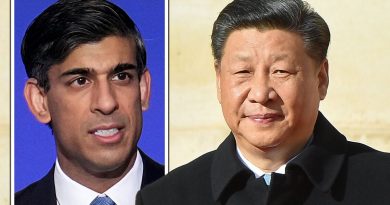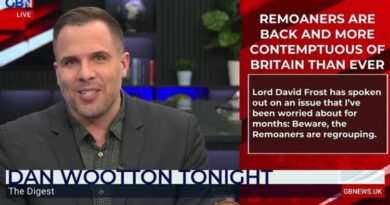‘Taxation without representation’: Democrats and Republicans clash over DC statehood
WASHINGTON – House Republicans accused Democrats of seeking political power Monday during a hearing to discuss making Washington, D.C., the 51st state.
Republicans on the committee pressed witnesses, including D.C. Mayor Muriel Bowser, on the constitutionality of making D.C. a state and accused Democrats of seeking statehood for political gain.
The House Oversight and Reform Committee held a hearing on the bill, aptly named H.R. 51 — the Washington, DC Admission Act — that would give D.C. and its residents statehood, something residents and leaders in the nation’s capital have been requesting for decades.
The bill previously passed in the last Congress, though it was not given a vote in the then-Republican-majority Senate. The 2020 passage in the House marked the first time a D.C. statehood bill passed in either chamber of Congress.
The legislation would allow for the admission of a new state, called Washington, Douglass Commonwealth, which would be represented by two senators and one member of Congress. The new state would be named for abolitionist Frederick Douglass, who spent the last 17 years of his life in the city.
The state’s territory would include all of the district’s current territory, except for monuments and federal buildings such as the White House and Capitol building.
Adding two D.C. senators would likely add to the slight Democratic advantage in the chamber, which is currently split 50-50 with Vice President Kamala Harris acting as a potential tiebreaker.
Since 2000, according to the Brookings Institute, the Democratic presidential nominee has captured over 89% of the vote in D.C.
Rep. Virginia Foxx, R-N.C., asked Bowser which direction the political pendulum swung in the District, and if the new senators would subsequently hold Democratic-beliefs.
“D.C. is a pawn being used by congressional Democrats to gain power,” Foxx said after Bowser said D.C. was “more than slightly Democratic.”
Rep. Gerald Connolly, D-Va., thanked Foxx for “letting the cat out of the bag” with her questioning about why Republicans have opposed statehood.
He said it’s wrong to assume how people would vote and called the questions “profoundly inappropriate.”
“Assumptions are dangerous,” Connolly continued, insisting statehood is about race and representation.
Rep. James Comer, R-Tenn., the committee’s top ranking Republican, described the legislation as “a key part of the radical leftist agenda to reshape America, along with the Green New Deal, defunding the police and packing the U.S. Supreme Court.”
Exclusive: 43% of Americans say a specific organization or people to blame for COVID-19
Zack Smith, a legal scholar from the conservative Heritage Foundation,argued that the framers of the Constitution wanted “to avoid one state have undue influence over the federal government” and that “D.C. residents already impact the national debate.
“For the members here today, how many of you saw D.C. statehood yard signs or bumper stickers or banners on your way to this hearing today?” he asked.
The Heritage Foundation’s Zack Smith, arguing against DC statehood, says DC residents “already impact the national debate” because members of Congress see their yard signs while driving to work. pic.twitter.com/g7fV3TopCX
Republicans insisted during the hearing that the Constitution specifically set aside land for the capital that was not a state.
The Constitution gives Congress the ability to set its own conditions for admitting a state but is vague on the subject of Washington, D.C. Under the Admission Clause, “New States may be admitted by the Congress into this Union,” and Article I, Section 8 of the Constitution allows Congress to create a “District (not exceeding ten miles square)” to become the seat of government.
Republicans also argued D.C. should not be a state because it does not have things like its own airport, landfill and more. They incorrectly stated several times D.C. does not have its own car dealership.
During her testimony, Bowser called the explanations against statehood “bad-faith arguments.” She countered assertions that D.C. is too small with how the nation’s capital is more populous than Wyoming and Vermont, has had a balanced budget for years and pays federal taxes.
“Arguing that Washingtonians must remain disenfranchised to protect the interests of the federal government is dangerous, outdated and downright insulting,” Bowser said.
Democrats and Bowser argued that statehood for D.C., a city with a Black plurality, is a civil-rights issue. Supporters say statehood is necessary because the residents are disenfranchised with the lack of representation in Congress.
“We are proud of our history of Black political power. In no way do we think that that should prevent us from what should be our right as Americans and as taxpayers in this nation. We believe very strongly that it is a civil rights and a voting rights issue. It suppresses the voices of thousands of African Americans in the nation’s capital,” Bowser said.
‘Vague and overly broad language’: South Dakota Gov. Kristi Noem won’t sign transgender sports bill
Census Bureau data shows that 46% of the district’s population is African American, 11% is Hispanic or Latino and 4% is Asian.
Supporters of statehood also continually referenced the concept of “taxation without representation,” and pointed to the Jan. 6 attack on the Capitol as a reason whystatehood is needed.
Rep. Jamie Raskin, D-Md., saidresidents of the District have a “very strong and legitimate grievance about being disenfranchised and not represented in Congress, and yet never attacked the U.S. Congress, broke our windows, stormed our chambers, or caused the deaths or injuries of more than 100 of our police officers.
“I want to thank you for following the nonviolent and constitutional path to political equality in America which is set forth in the Constitution itself,” he continued.
Trump supporters stormed the U.S. Capitol on Jan. 6 in an attempt to stop the counting of the electoral votes for President Joe Biden.
‘A nightmare scenario’: Extremists in police ranks spark growing concern after Capitol riot
Governors have the authority to deploy the National Guard, but due to D.C.’s status as a federal district rather than a territory, Bowser was unable to do so for support on Jan. 6 because, despite being the top official, she is mayor. The power to call the National Guard in D.C. currently lies with the president, secretary of Defense and secretary of the Army.
If H.R. 51 passes the House again, it would face a 50-50 divided Senate with the looming prospect of the filibuster. Without at least 10 Senate Republican votes joining all 50 Democrats and independents, the legislation would not make it to Biden’s desk.
Contributing: Nicholas Wu
Source: Read Full Article


